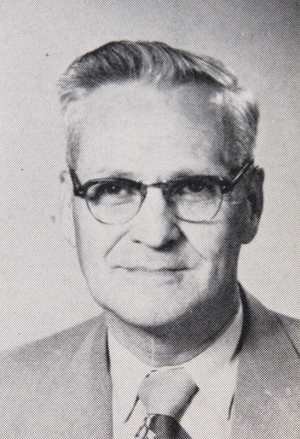Funds will help CSC health professions remain strong

In light of today's weakened economy and intense competition from other institutions of higher education, the Chadron State College Health Professions Program and the Chadron State Foundation has begun seeking funds to ensure the health sciences remain among the college's pinnacle success stories.
One strategy for retaining and building on the quality is the implementation of a new fund named after the late Charles E. Ruff, the professor who taught biology 1946-1965 and pioneered CSC's reputation for turning out quality health professions graduates.
"Alumni have told me that when Charles Ruff called medical schools to tell them that he had a candidate for their program, they were almost always accepted," said Connie Rasmussen, director of the Chadron State Foundation. "CSC's health professions program has continued that incredible legacy by turning out successful health professionals year after year."
Rasmussen said the new fund is being initiated to honor not only Ruff, but all of those who have been active in developing CSC's Health Professions Program.
One such visionary is the late Jay Druecker, the CSC professor who was instrumental in starting the Rural Health Opportunities Program at Chadron. RHOP is the collaboration between CSC and the University of Nebraska Medical Center which addresses the needs of rural Nebraska by encouraging rural residents to pursue health care careers. If selected to the program, students obtain early admission into participating UNMC colleges upon completion of studies at Chadron State.
The story about how CSC is helping meet the high demand for health professionals in Nebraska's small communities is not new. Of course, CSC often attracts students from rural backgrounds in all of its programs, and those students often aspire to have a career in a small-town setting.
A report from the CSC Health Professions Office shows that more than half of students who have completed the Rural Health Opportunities Program at CSC are taking jobs in rural communities after they complete their studies.
In all, 83 students are enrolled in RHOP at CSC, and about 460 more are studying health professions outside of the program. Thirty-seven students were inducted to CSC's RHOP this spring. Of the program's nine disciplines, however, only medical and dental students are guaranteed scholarship assistance.
CSC's health professions students outside RHOP also have been highly successful. Statistics show 78 percent of that contingent has been accepted to professional school after completing studies at CSC.
Rasmussen said the Ruff fund will be used largely at the department's discretion, including scholarships, student support, travel and equipment. Perpetual support will be given in the form of an endowment.
Dr. Twila Fickel, the CSC faculty member who directs the health professions program, said that recruiting pressure from other colleges and universities is becoming increasingly intense. Few other institutions, though, have developed a reputation like CSC's, she said. In order to gain financial support, letters are being sent to CSC health professions alumni and community health professionals.
Rasmussen noted that the Ruff endowment isn't the only opportunity for health professions alumni to contribute to the program that was instrumental to their success. She encourages people who wish to contribute financial assistance for the program to contact the Chadron State Foundation. Almost 20 funds have been designated for health professions students.
Category: Campus News
